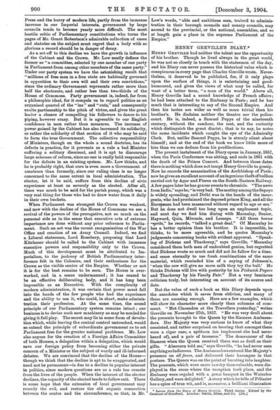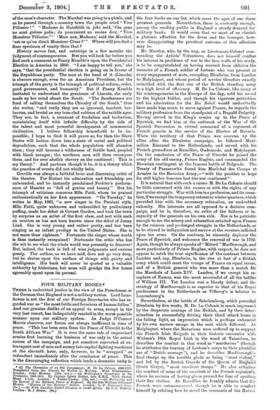HENRY GREVILLE had neither the talent nor the opportunity of
his brother. Though he lived always in the great world, he was not so closely in touch with the statesmen of the day, and his Diary can never possess the historical value which is conspicuous in every page that Charles Greville wrote. Never- theless, it deserved to be published, for, if it only plays upon the surface of things, it is entertaining and good- humoured, and gives the views of what may be called, for want of a better term, "a man of the world." Above all, Henry Greville had a sound knowledge of French affairs ; he had been attached to the Embassy in Paris ; and he has much that is interesting to say of the Second Empire. And then his tastes are wider as well as more trivial than his brother's. He disdains neither the theatre nor the police- court. He is, indeed, a Samuel Pepys of the nineteenth century, without the candour, the zest, and the curiosity which distinguish the great diarist ; that is to say, he notes the same incidents which caught the eye of the Admiralty Clerk. But, unlike Samuel Pepys, he is sternly silent about himself ; and at the end of the book we know little more of him than we can deduce from his predilections.
The present instalment of the Diary opens in January, 1857, when the Paris Conference was sitting, and ends in 1861 with the death of the Prince Consort. And between those dates there is nothing which does not tempt Henry Greville to gossip. Now he records the assassination of the Archbishop of Paris ; now he gives an excellent account of an ingenious theft of bullion carried out by Agar and Pierce on the South-Eastern Railway. A few pages later he has graver events to chronicle. "The news from India," says he," is very bad. The mutiny among the Sepoys is widely spreading. and Delhi was in the hands of the insur- gents, who had proclaimed the deposed prince King, and all the Europeans had been massacred without regard to age or sex." But he does not dwell too long upon an unpleasant topic, and next day we find him dining with Macaulay, Senior, Hayward, Quin, Merimee, and Lesseps. "All these beaux -sprits," he records, "talked a great deal." Of Macaulay he has a better opinion than his brother. It is impossible, he thinks, to be more agreeable, and he quotes Macaulay's judgments concerning books with evident approval. "Speak- ing of Dickens and Thackeray," says Greville, "Macaulay considered them both men of undoubted genius, but regretted that Dickens wrote so much and did not lie fallow for a time, and cease eternally to use fresh combinations of the same material, which reminded him of a saying of Johnson's, when the cow will give no more milk they try the bull.' He thinks Dickens will live with posterity by his Pickwick Papers and Thackeray by his Vanity Fair." Not a very luminous criticism truly, but interesting on account of its source and date.
But the value of such a book as this Diary depends upon the anecdotes which it saves from oblivion, and many of these are amusing enough. Here are a few examples, which will show its character more clearly than columns of com- ment. "Met Clarendon at the Travellers yesterday," writes Greville on November 27th, 1857. "He was very droll about the presents brought to the Queen by the Siamese Ambassa- dors. Her Majesty was very curious to know of what they consisted, and rather surprised on hearing that amongst them were a cigar case, a spittoon (au implement she had never heard of), and a pair of trousers." The demeanour of the Siamese when the Queen received them was as droll as their gifts. " Abercorn told me," says Greville, "he had never seen anything so ludicrous. The Ambassadors entered Her Majesty's presence on all fours, and delivered their harangue in that posture. The Queen was on the point of bursting into laughter. The presents, which were more tawdry than valuable, were dis- played in the room where the reception took place, and the Embassy were regaled with a great banquet in the Waterloo Gallery, and were delighted." A story which he tells of Pelissier has a spice of true wit, and is, moreover, a brilliant illustration
• Leaves from the Diary of Henry GreviZle. Third Series. Edited by the Countess of Strafford. London Smith, Elder, and Co. Ins...) of the man's character. The Marshal was going to a picnic, and as he passed through a country town the people cried "'Vivo Pillager ! " " Madame de Hatzfeldt in joke said, Ces gene ne sent gueres polls; ils poturaient an moms dire, " Vive Monsieur Pelissier." Mais non, Madame,' said the Marshal, 'eat-ce qu'on dirait Monsieur Cesar P' " Where will you find a finer specimen of vanity than that I'
History moves fast, and outstrips in a few months the judgment of contemporaries. But you will look far before you find such a comment as Fanny Kemble's upon the Presidential Election in America in 1860. "I am happy to tell you," she says, "that the presidential election is going on in favour of the Republican party. The man at the head of it (Lincoln) is obscure enough, even for an American President, but the triumph of the party is the triumph of political reform, order, good government, and humanity." But if Fanny Kemble hesitated to understand the greatness of Lincoln, she early made up her mind about the South. "The Southerners are fond of calling themselves the Chivalry of the South," thus she writes, "and verily they are as ignorant, insolent, bar- barous, and brutal as any iron-clad robbers of the middle ages. They are, in fact, a remnant of feudalism and barbarism, maintaining itself with infinite difficulty by the side of the talent and most powerful development of commercial civilisation. I believe fellowship henceforth to be im- possible; I hope to God it will prove so, for then the Slave States will hasten down into a state of social and political degradation, such that the whole population will abandon them; tbey will become a, wilderness of fertile land, peopled with black savages ; the northern men will then reconquer them, and for ever abolish slavery on the continent ! This is my theory." And partisan though it be, it is a theory which the practice of events did not wholly belie.
Greville was always a faithful lover and discerning critic of the theatre. For Ristori his admiration and friendship are unbounded, and he instantly proclaimed Fechter's perform- ance of Hamlet as "full of genius and beauty." But his triumph of criticism concerns Mile. Patti, whom he praised enthusiastically on her first appearance. "On Tuesday," he writes in May, 1861, "a new singer in the Persiani style, Mlle. Patti, quite unknown and unheralded by preliminary puffing, made her debut at Covent Garden, and took the town by surprise as an artist of the first class, and met with such an ovation as has not been known since the debut of Jenny Lind. She is very young and rather pretty, and has been• singing as an infant prodigy in the United States. She is not more than eighteen." Fortunate the singer whose worth is thus instantly recognised! Fortunate the critic who has the wit to see what the whole world was presently to discover! But, indeed, the book is full of wise judgments and curious gossip. The author, as we have said, does not go very deep, but he skates upon the surface of things with gaiety and intelligence. His book will never be quoted as a valuable authority by historians, but none will grudge the few hours; agreeably spent upon its perusal.
FOUR MILITARY BOOKS.*







































































 Previous page
Previous page